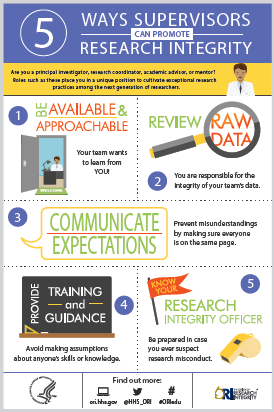New Infographic: 5 Ways Supervisors Can Promote Research Integrity
Responsible conduct of research stems from more than one individual’s behavior - it is a learned and shared culture of promoting integrity. One of the first places new scientists are exposed to this culture is in graduate school, where they start to learn the practices and norms of their chosen field. Those who train students and post-docs have a significant influence on trainees’ perceptions of good research practices.
1. Be Available and Approachable
Take the time to cultivate a relationship with your trainees. They are there to learn from you, so discuss progress and problems in an open and constructive manner. This can encourage conversation, promote transparency, and make them more comfortable coming to you with questions or concerns.
2. Review Raw Data
You are responsible for any data put forth by your research group. Regularly reviewing raw data, especially results related to any paper, grant, or poster; this can help catch both honest errors and intentional manipulations before they get out your door.
3. Communicate Your Expectations
Be clear about individual roles and responsibilities regarding experiments, data management, authorship, and timelines of projects, as well as how trainees will be evaluated. Consider adopting a formal onboarding process and posting written standards in the lab.
4. Provide Training and Guidance
Not all trainees will arrive with the same skill level. Avoid making assumptions about anyone’s prior knowledge by regularly reviewing protocols, proper use of equipment, and data storage and management.
5. Know Your Research Integrity Officer (RIO)
Be prepared in case you ever suspect research misconduct. Find out now who the RIO is at your institution and share their contact information with your research team.

